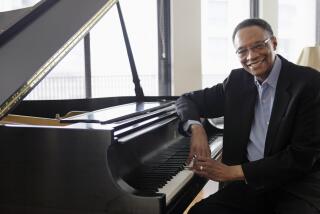Ramey’s Voice Brightens a Dark Stage
- Share via
Vaguely menacing, dressed entirely in black and looking more like a couple of cops on an investigation than two musicians about to perform, Samuel Ramey and pianist Warren Jones came onstage at Segerstrom Hall on Sunday afternoon. Dim, noirish lighting added to the dark impression.
Then they proceeded to give one of the more satisfying recitals the Orange County Performing Arts Center has witnessed in its first 16 years.
How did they do it? Charm, smarts and utter concentration. These two do not recite, they tell stories, narrate, infer, suggest, create atmosphere and let tone and words do the coloring. Text is the background on which they paint their musical drawings, and variety is their most important tool.
The program offered first a fascinating operatic gallery of characters Ramey has played in his nearly 30-year career on the stage; second, a pungent group of songs by American composers. Each musical item contributed a different facet to the total.
At 60, Ramey remains at a plateau of communicative command. With his resourceful basso instrument, he can threaten, snarl, entice, suggest, seduce, charm and convince, sometimes all in the same aria or song. The power he wields over an audience, as he did over the audience Sunday afternoon, comes out of sincerity, not artifice, and he uses this power at all times pointedly.
After warming up carefully in arias by Handel and Purcell, he reached some dramatic peaks in arias from Boito’s “Mefistofele” and Carlisle Floyd’s “Susannah.” But he touched his listeners most deeply in selections from Copland’s “Old American Songs,” in four showpiece songs by Charles Ives and, particularly, in songs by the Gershwins and by Cole Porter.
With the complete and nuanced support of pianist Jones, Ramey made “They All laughed,” “Embraceable You,” “I’ve Got You Under My Skin,” “Ev’ry Time We Say Goodbye” and “Don’t Fence Me In” rare occasions of deep pleasures, genuine sentiment and powerful feelings.
His first encore was “Non piu andrai,” from “The Marriage of Figaro.”
More to Read
The biggest entertainment stories
Get our big stories about Hollywood, film, television, music, arts, culture and more right in your inbox as soon as they publish.
You may occasionally receive promotional content from the Los Angeles Times.










